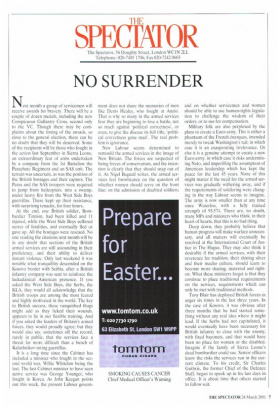SPECTAT rm OR
The Spectator, 56 Doughty Street, London WC1N 2LL Telephone: 020-7405 1706; Fax 020-7242 0603
NO SURRENDER
Next month a group of servicemen will receive awards for bravery. There will be a couple of dozen medals, including the new Conspicuous Gallantry Cross, second only to the VC. Though there may be complaints about the timing of the awards, so close to the general election, there can be no doubt that they will be deserved. Some of the recipients will be those who fought in the action last September in Sierra Leone, an extraordinary feat of arms undertaken by a company from the 1st Battalion the Parachute Regiment and an SAS unit. The terrain was uncertain, as was the position of the British hostages and their captors. The Paras and the SAS troopers were required to jump from helicopters, into a swamp, under heavy fire from the West Side Boys guerrillas. These kept up their resistance, with surprising tenacity, for four hours.
At the end, one British soldier, Bombardier Tinnion, had been killed and 11 injured, while the West Side Boys suffered scores of fatalities, and eventually fled or gave up. All the hostages were rescued. No one reading the citations next month will be in any doubt that sections of the British armed services are still astounding in their proficiency, and their ability to deliver instant violence. Only last weekend it was notable what tranquillity descended on the Kosovo border with Serbia, after a British infantry company was sent to reinforce the lackadaisical American presence. If you asked the West Side Boys, the Serbs, the KLA, they would all acknowledge that the British troops are among the most feared and highly motivated in the world. The key to British success, these vanquished thugs might add as they licked their wounds, appears to lie in our flexible training. And if you asked the leaders of Britain's armed forces, they would proudly agree: but they would also say, sometimes off the record, rarely in public, that the services face a threat far more difficult than a bunch of Kalashnikov-toting guerrillas.
It is a long time since the Cabinet has included a minister who fought in the second world war, Willie Whitelaw being the last. The last Cabinet minister to have seen active service was George Younger, who fought in Korea. As John Keegan points out this week, the present Labour govern ment does not share the memories of men like Denis Healey, who fought at Anzio. That is why so many in the armed services fear they are beginning to lose a battle, not so much against 'political correctness', or even, to give the disease its full title, 'political correctness gone mad'. The real problem is ignorance.
New Labour seems determined to remould the armed services in the image of New Britain. The forces are suspected of being forces of conservatism, and the intention is clearly that they should snap out of it. As Nigel Bagnall writes, the armed services feel browbeaten on the question of whether women should serve on the front line; on the admission of disabled soldiers; and on whether servicemen and women should be able to use human-rights legislation to challenge the wisdom of their orders, or to sue for compensation.
Military folk are also perplexed by the plans to create a Euro-army. This is either a phantasm of the French enarques, intended merely to tweak Washington's tail; in which case it is an exasperating irrelevance. Or else it is a genuine attempt to create a new Euro-army, in which case it risks undermining Nato, and imperilling the assumption of American leadership which has kept the peace for the last 45 years. None of this might matter if the need for the armed services was gradually withering away, and if the requirements of soldiering were changing in the way Labour seems to imagine. The army is now smaller than at any time since Waterloo, with a fully trained strength of 95,574. There are, no doubt, many MPs and ministers who think, in their heart of hearts, that this is no bad thing.
Deep down, they probably believe that human progress will make warfare unnecessary, and all matters will eventually be resolved at the International Court of Justice in The Hague. They may also think it desirable if the armed services, with their reverence for tradition, their shining silver and their macho culture, should learn to become more sharing, maternal and righton. What these ministers forget is that they continue to place traditional requirements on the services, requirements which can only be met with traditional methods.
Tony Blair has deployed British forces in anger six times in the last three years. In the case of Kosovo, it was obvious after three months that he had started something without any real idea where it might lead. If the Serbs had not capitulated, it would eventually have been necessary for British infantry to close with the enemy, with fixed bayonets, and that would have been no place for women or the disabled. Imagine if the family of Sierra Leone's dead bombardier could sue. Senior officers know the risks the services run in the current climate. To his credit, Sir Charles Guthrie, the former Chief of the Defence Staff, began to speak up in his last days in office. It is about time that others started to follow suit.














































































 Previous page
Previous page